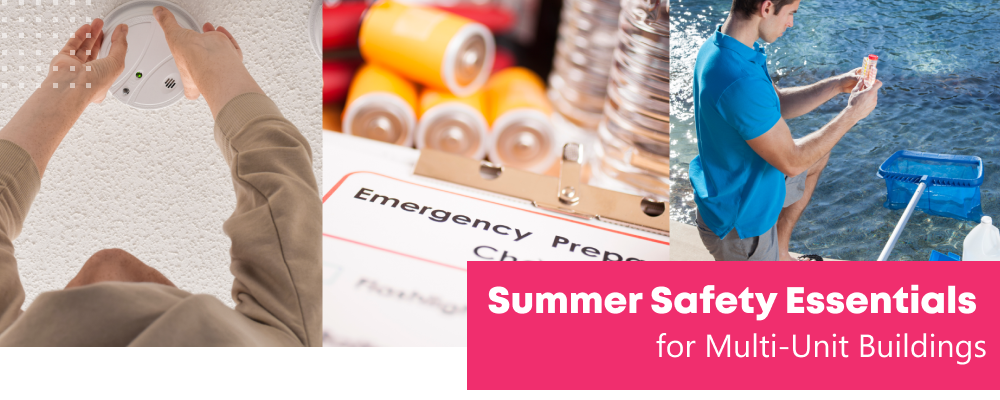Summer Safety Essentials for Multi-Unit Buildings
Essential Summer Safety Tips for Multi-Unit Property Managers
As a property manager with years of experience overseeing multi-unit buildings, I’ve come to recognize that summer safety for buildings isn’t something to overlook or leave to chance. When the sun comes out and temperatures rise, so do the risks: fires, pool accidents, pest infestations, and unplanned emergencies can escalate quickly in a shared living environment.
That’s why I treat seasonal preparation as an essential part of building maintenance. In this blog, I’ll walk through my top summer safety priorities for multi-unit properties—from fire safety to pest control and emergency plans—so you can keep your property safe, your tenants happy, and your investment protected.
Fire Safety: Proactive Measures to Prevent Summer Disasters
There’s no season more prone to fire incidents than summer. With more frequent barbecues, overloaded electrical systems due to air conditioning, and increased use of outdoor equipment, fire risks spike significantly. Here’s what I recommend based on practices that have worked well in my buildings:
Inspection & Maintenance
I start each summer by testing smoke detectors and sprinkler systems in every unit and common area. Batteries are replaced, and any outdated equipment is flagged for upgrades. Don’t forget electrical panels—overheating and circuit overload are common issues in warm months.
Outdoor Cooking & BBQ Safety
If your building permits barbecues, create designated zones with non-flammable surfaces. Post visible signage about BBQ safety, and install fire extinguishers nearby.
Evacuation Plans
Print and post clear evacuation maps in hallways, stairwells, and elevators. These are not only helpful but required by most building codes. I also ensure my building staff is trained on how to respond to electrical or grease fires.
Helpful Resource:
National Fire Protection Association: Fire Prevention Tips
Pool Rules: Fun Doesn’t Mean Unsafe
Pools are a luxury, but they come with serious responsibilities. I’ve learned that strong, well-communicated policies help reduce liability and enhance safety.
Clear Signage
Every summer, I review all pool signage to make sure it’s legible and up to code. Hours of operation, supervision requirements, and emergency contact numbers should be highly visible.
Supervision Policies
Children should never swim unsupervised. I post guidelines requiring children under 14 to be accompanied by an adult. Some properties hire lifeguards, while others rely on posted rules and tenant awareness.
Safety Equipment
I make sure that life rings, rescue hooks, and a basic first aid kit are available in the pool area. Self-latching gates and perimeter fencing are also non-negotiable.
Helpful Resource:
CDC Pool Safety Guidelines
Pest Control: Proactive is Better Than Reactive
Pests thrive in summer—and once they’re inside, it can be hard to get them out. I’ve had my fair share of pest challenges, and over time, I’ve developed a layered prevention strategy.
Structural Prevention
Start by sealing exterior cracks, installing door sweeps, and using screens on vents and windows. These barriers do wonders against rodents, roaches, and ants.
Professional Partnerships
I work with a licensed pest control service to conduct regular inspections. Having monthly treatments during summer has helped me avoid major infestations.
Educating Tenants
Tenants may unknowingly contribute to pest problems. I provide seasonal flyers reminding them to keep food sealed, dispose of trash properly, and avoid leaving standing water around patios.
Helpful Resource:
Environmental Protection Agency: Pest Prevention Guide
Emergency Preparedness: Create a Plan, Not a Panic
Emergencies don’t wait for convenient times. In my buildings, I make emergency planning a priority—not just for compliance, but because it protects people and property alike.
Communication Plans
I distribute emergency contact cards that include my on-call maintenance crew, local utilities, poison control, and first responders. These cards are also available on our tenant portal.
Cooling Strategies
In heatwaves, I designate cooling areas such as the clubhouse or leasing office. I also keep water coolers available in lobbies, especially during long maintenance jobs or power outages.
Emergency Supplies
It’s wise to keep a stockpile of flashlights, water, batteries, and basic medical supplies in the building office or maintenance room. I also run a quick orientation each year for residents about what to do during hurricanes or prolonged outages.
Helpful Resource:
https://www.ready.gov/summer-weather
The Key Phrase in Action
Let me emphasize again: summer safety for buildings isn’t just a box to check off—it’s a framework for protecting your investments, keeping your community healthy, and demonstrating your commitment to resident well-being. In fact, one of the best ways I’ve maintained tenant trust over the years is by staying ahead of summer risks. I ensure that summer safety for buildings is woven into every aspect of seasonal prep: from planning fire escape drills to posting pool rules and distributing pest prevention guides. That kind of thoroughness pays off—both in peace of mind and in property performance metrics.
Final Thoughts: It’s About Prevention, Not Reaction
Summer safety can feel overwhelming, but with preparation, it becomes routine. By integrating fire safety, enforcing pool guidelines, staying on top of pest control, and outlining emergency plans, property managers like me can lead with confidence and create safe, happy environments where tenants feel cared for.
Remember, every step you take reduces risk—and that’s what smart property management is all about. If you’re looking for turnkey services to simplify your seasonal prep, feel free to explore resources and community services offered by OptivoGroup.net. Your next great summer starts with a solid safety plan.
Outbound Links:
To further strengthen your seasonal strategies, these expert resources offer valuable insights:
- Red Cross Emergency Preparedness Guide
https://www.redcross.org/get-help/how-to-prepare-for-emergencies.html - OSHA Heat Safety Tips
https://www.osha.gov/heat - HUD Disaster Preparedness Planning
https://www.hud.gov/info_disasterresources - Local Building Code Directory (State Specific)
https://www.iccsafe.org/codes-tech-support/codes/code-development-process/building-code-adoption-tool - PestWorld: Pest Identification and Solutions
https://www.pestworld.org
